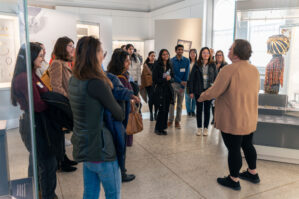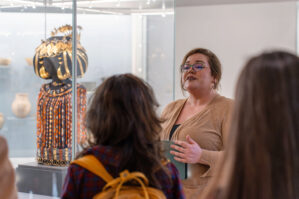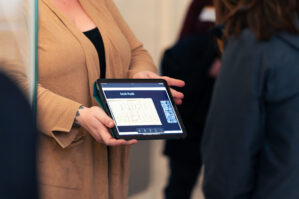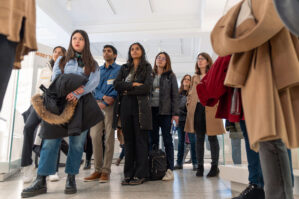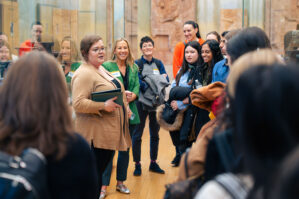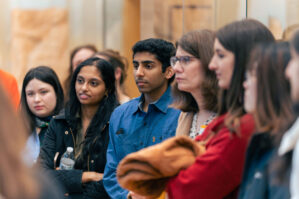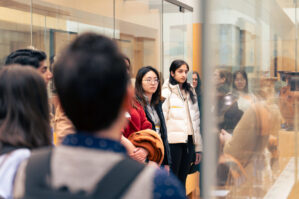Analytics at Wharton
News
Women in Data Science @ Penn 2024 Recap
Analytics at Wharton and Penn Engineering had the distinct pleasure of hosting the fifth annual Women in Data Science (WiDS) @ Penn Conference on February 8th and 9th. A celebrated interdisciplinary event open to everyone, WiDS @ Penn is part of the larger WiDS Worldwide initiative, which aims to elevate and celebrate the outstanding work of women on a global scale, fostering respect, collaboration, connection, and visibility within the data science community.
The conference got off to a historic start on Thursday, February 8, as attendees participated in a guided tour of the Penn Museum. Expert Museum staff introduced attendees to powerful female figures throughout ancient history and highlighted the adventurous women who excavated ancient sites and translated yet-to-be-deciphered scripts. Key figures among the museum exhibits were Enheduanna, a Sumerian priestess who likely bears the title of the world’s first named author, and Queen Puabi, whose decadent wardrobe accentuates the museum’s vibrant and wide-ranging collection.
Following the tour, the group gathered to hear about the Evolution of Data Storytelling in a presentation from Sarah Linn, PhD, Assistant Director of Academic Engagement at the Penn Museum, and Jamie Samper, PhD, Associate Director of Computing & Research Support at Analytics at Wharton. Together, the pair illustrated how storytelling has always permeated our day-to-day lives, from historic artifacts to cutting-edge datasets.
WiDS Penn Museum Tour
The positive energy from Thursday evening at the Penn Museum continued bright and early on Friday, as more than 120 attendees across industry and academia made their way to the eighth floor of the Wharton School’s Huntsman Hall for a day of presentations, networking, and celebrating the great work women are accomplishing in the field of data science.
Nasrin Mostafazadeh, Co-Founder of Verneek AI and the keynote speaker, started the conference off by taking attendees on a journey through the modern history of artificial intelligence, charting its humble beginnings, its occasional financial and industrial “winters,” and finally its recent, world-altering rise. While Mostafazadeh has been an expert in the field since long before ChatGPT, it hasn’t always been a welcoming experience.
“I’ve been the only woman in every single room I’ve been in my whole life,” she said, “from when I was a kid trying to be a computer scientist back in Iran, to now in the U.S. being an entrepreneur and having my own company.” She remarked that events like WiDS @ Penn offer essential opportunities for women to collaborate and share ideas in the field of data science – especially younger women and girls. “I have been a big advocate of getting more women into the field of computer science and technology from earlier ages.”
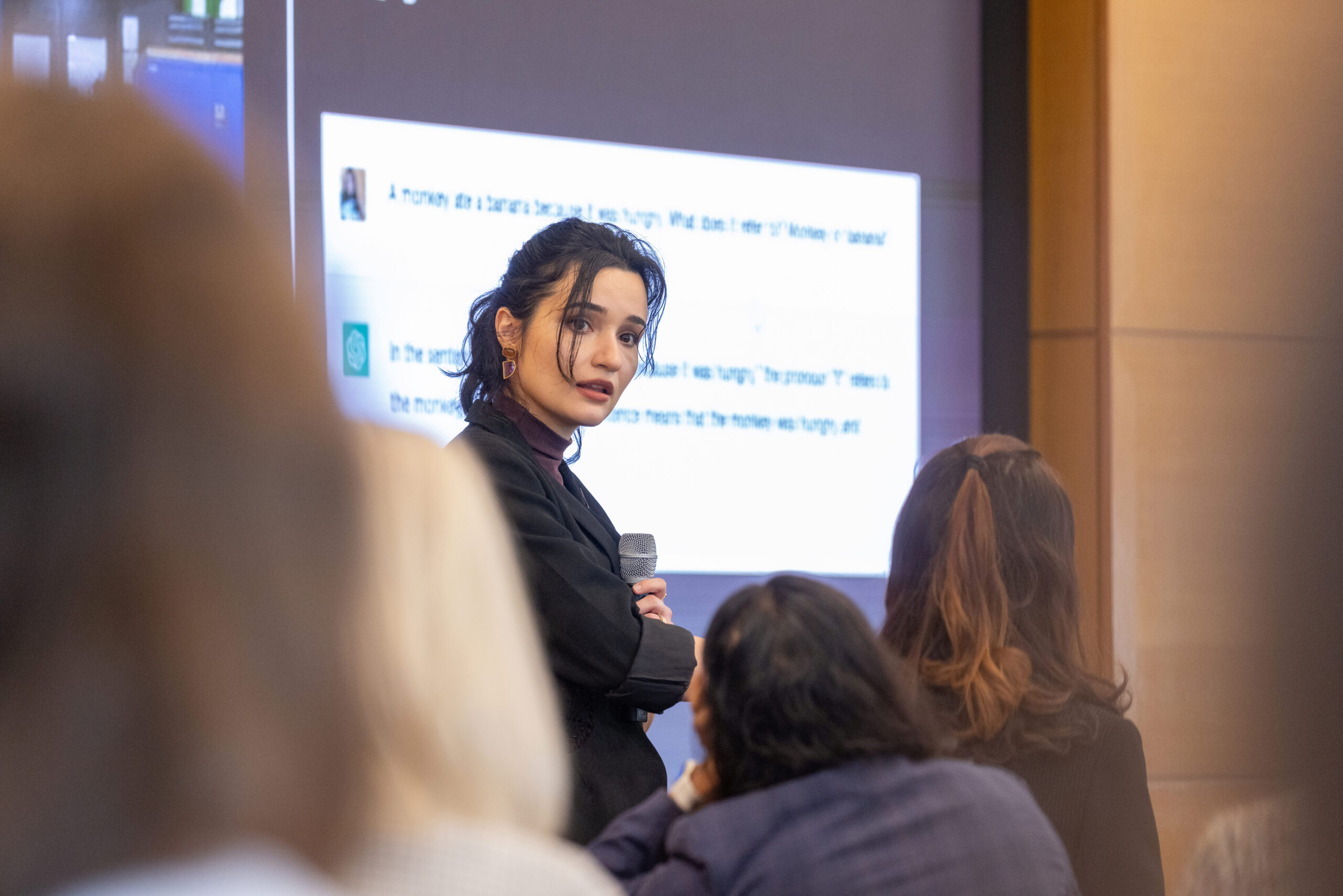
Wharton junior Annie Wang, a young female data scientist in her own right, presented on her work with the Kimmel Cultural Center in Philadelphia as part of her participation in the Analytics Accelerator. This is an eight-week project hosted by Analytics at Wharton each semester that pairs teams of students with companies to help them wrangle their data and provide solutions to real business questions. Annie demonstrated a churn model with 70-plus features that her team created for the Kimmel Cultural Center to develop an optimal email schedule.
“The Women in Data Science Conference is such a great way for females to come together to not only discuss the innovations and advancements in Large Language Models (LLMs), AI, and data science in general, but also to really put the way forward to encourage more female students to explore the field of data science in general,” said Wang.
Hamsa Bastani, Associate Professor of Operations, Information, and Decisions at the Wharton School, Lilach Mollick, Director of Pedagogy at Wharton Interactive, and Hether Danforth, General Manager of Education Solutions, US Education and Academic Medical Centers at Microsoft, held a panel discussing the various and perhaps unexpected ways generative AI models are poised to impact jobs, education, and research.
When asked how generative AI is impacting the healthcare space, Bastani, who is also the faculty co-lead of the Wharton Healthcare Analytics Lab, offered an optimistic but cautioned outlook. “I think we’re getting to the point where healthcare costs are rising so much that we have to do very careful resource allocation, whether that resource is physician time…or drug shortages, every problem we’re thinking about is who needs it most?”
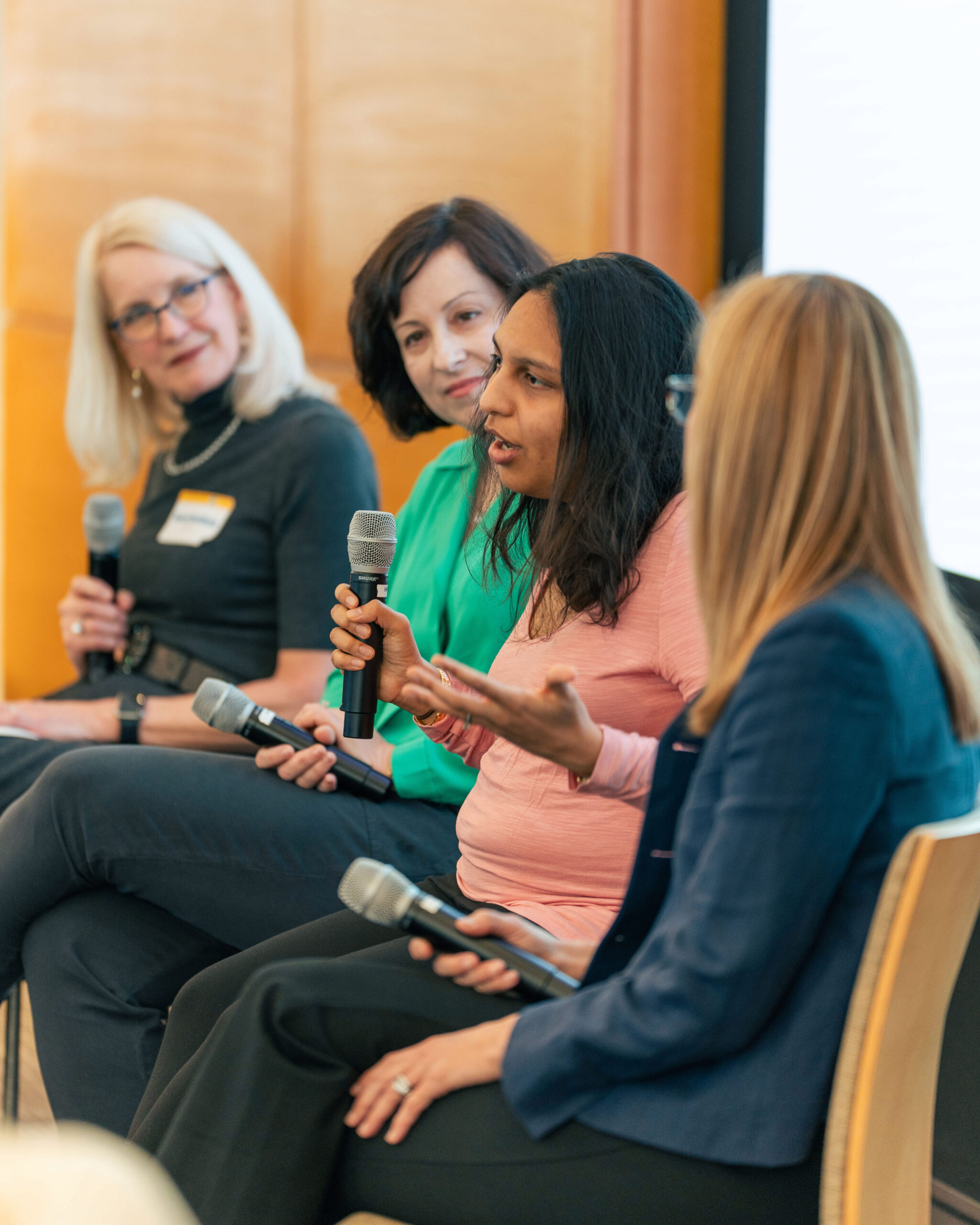
“Generative AI is an awesome technology that has the power to reduce these [healthcare] resource constraints.”
Hamsa Bastani, Co-Director, Wharton Healthcare Analytics Lab
“Generative AI is an awesome technology that has the power to reduce these resource constraints. If you have physician or nursing shortages, and you can use these tools, for example, to fill out or at least draft medical notes, then we might be able to better leverage their time towards being patient-facing and actually collecting things that only a human can collect.”
While the utility offered by these new tools is sure to help improve some aspects of the healthcare experience, Bastani was quick to point out how much work needs to be done to improve the models that inform AI output.
“We have a lot of these case studies where people will say, [for example], a female patient asked about symptoms they were having that looked like a heart attack, but the AI model said that women probably needed psychological therapy or something like that. Whereas, if a man puts in those same symptoms, it immediately directs them to ‘heart attack.’ This is partly because of human data – we’ve generally not diagnosed heart attacks well for women. We have for men. It’s unclear how we are going to go about resolving those issues.”
With so many of the conference’s presentations focusing on AI, audience members were introduced to new and novel approaches for better serving their customers at work. Adriana Ochoa of Project SEED, a Delaware-based non-profit building self-reliance and sustainability, didn’t enter the day with an extensive data science background, but she left feeling more informed and energized about these emerging technologies.
“I was hoping by attending this conference that I would be able to generate a more informed needs assessment for the communities that we serve. My experience at WiDS has been very positive and informative. It’s like my mind has been expanded to a completely different field that I hadn’t been exposed to before. As we work with different mentees from different ages, the field of AI is something that’s going to be important to bring back to the communities that we serve,” she said.
To learn more about the fifth annual WiDS @ Penn Conference, visit our event page here.



